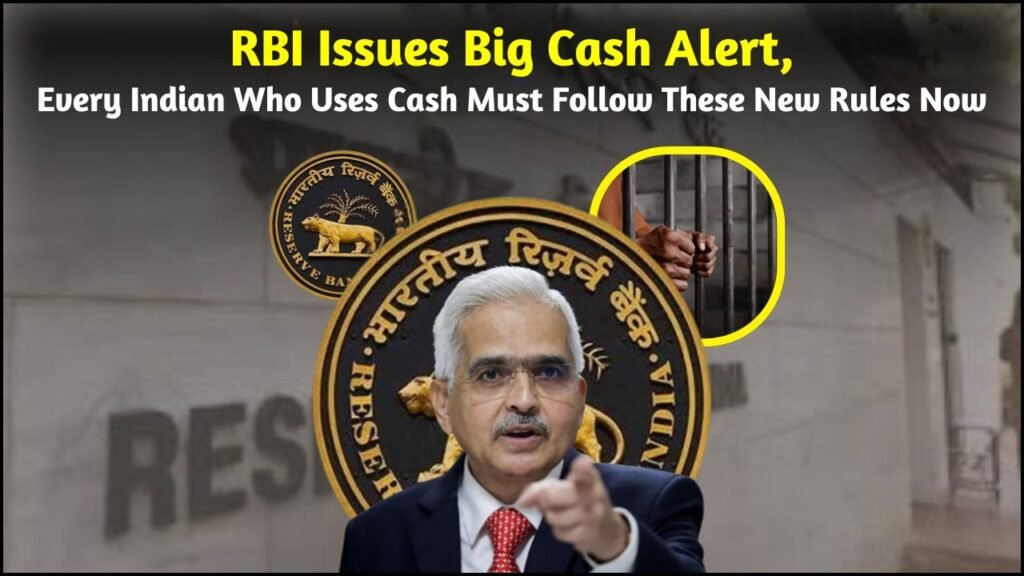
In a significant step towards improving financial transparency and combating the menace of black money, the Reserve Bank of India (RBI) has rolled out fresh regulations for handling cash in India. These new guidelines impact both individuals and businesses that frequently engage in cash transactions, especially those involving large sums. Whether you’re a business owner, professional, or someone who routinely deals with cash, it is crucial to understand and comply with these rules to avoid penalties or legal issues.
Why Has the RBI Introduced New Cash Rules?
The RBI’s latest move is aligned with the government’s broader goal of transitioning India towards a digital economy. The central bank aims to curb illegal cash dealings, tax evasion, and money laundering by tightening control over large cash transactions.
Here are the key reasons behind these new cash-handling guidelines:
- To limit the circulation of black money.
- To enhance transparency in the financial system.
- To promote the use of digital and banking platforms for transactions.
- To align India’s cash handling practices with global norms.
Key RBI Cash Rules to Know in 2025
The RBI has laid out several new norms that cash users must adhere to, especially when the amount involved exceeds specified limits.
1. PAN or Aadhaar Compulsory for Large Cash Transactions
- Individuals or businesses making cash deposits or withdrawals over ₹50,000 in a day must provide either their Permanent Account Number (PAN) or Aadhaar.
- Aadhaar details must also be verified and linked to the bank account.
2. Monthly Limit on Cash Withdrawals
- A monthly withdrawal limit of ₹20 lakh has been set. Exceeding this threshold may lead to Tax Deducted at Source (TDS) as per Section 194N of the Income Tax Act.
- This rule applies regardless of whether the individual files regular income tax returns.
3. Ban on Cash Transactions Above ₹2 Lakh
- Any cash transaction over ₹2 lakh in a single day with an individual or entity is not allowed.
- If violated, the entire amount may be penalized and considered unlawful under Section 269ST of the Income Tax Act.
4. Businesses Must Keep Cash Logs
- Businesses handling cash amounts exceeding ₹10,000 per day must now maintain digital records of these transactions.
- Any cash payment beyond ₹10,000 to a single party may not be eligible for tax deductions during audits.
5. Restrictions on Real Estate Deals
- Cash payments above ₹20,000 related to real estate, whether by buyers, builders, or brokers, are under increased surveillance.
- All parties must maintain digital records and disclose cash dealings to tax authorities.
Quick Overview: RBI Cash Rules 2025
| Rule | Limit/Requirement | The bank may reject or report |
|---|---|---|
| PAN/Aadhaar for large transactions | Over ₹50,000 | Bank may reject or report |
| Monthly withdrawal cap | ₹20 lakh | 2%-5% TDS applies |
| Daily cash transaction limit | ₹2 lakh | Penalty equals transaction |
| Cash for business expenses | Over ₹10,000 | Disallowed in tax returns |
| Real estate cash limit | ₹20,000 | Tax department monitoring |
| Gifts in cash | Over ₹50,000 | Treated as taxable income |
| Political party donations | Max ₹2,000 in cash | Non-compliant funds rejected |
Penalties for Non-Compliance
Failure to comply with these rules could lead to serious consequences, including penalties, disallowance of deductions, tax scrutiny, or even legal prosecution.
| Violation Type | Applicable Law | Possible Penalty |
|---|---|---|
| Accepting > ₹2 lakh in cash | Section 269ST | 100% of the amount received |
| Withdrawals beyond ₹20 lakh | Section 194N | TDS of 2% to 5% |
| No PAN/Aadhaar for large cash | RBI/Income Tax rules | Transaction rejection |
| Cash expense > ₹10,000 by business | Section 40A(3) | Not allowed for deductions |
| Real estate deals in cash | Benami Act | Property confiscation |
| Undisclosed political donations | Election Trust Rules | Fund seizure and de-registration |
RBI Encourages Digital Transactions
As a part of this shift, the RBI is also urging citizens and businesses to move toward digital payment platforms for better accountability.
Popular Digital Payment Options:
- UPI (Unified Payments Interface)
- Debit/Credit Cards
- Internet Banking (NEFT, RTGS, IMPS)
- Mobile Wallets like Paytm, PhonePe, Google Pay
- Aadhaar-Enabled Payment Systems (AePS)
Benefits of Digital Transactions:
- Enhanced security and reduced risk of cash theft
- Instant settlements and real-time tracking
- Cashback and promotional offers
- Easy tax compliance and audit trails
- Environmentally friendly and more hygienic
Who Will Be Most Affected?
These stricter norms are expected to significantly impact:
- High-cash sectors such as jewelry, real estate, construction, and farming
- Professionals like doctors, event organizers, and wedding planners
- Political parties and NGOs that receive large donations
- Local traders and vendors in the unorganized sector
How to Stay Compliant?
Here are some easy steps to ensure you’re following the RBI’s latest guidelines:
- Always provide PAN or Aadhaar for any high-value cash dealings.
- Avoid giving or receiving over ₹2 lakh in cash.
- Maintain detailed records of every transaction—digital and physical.
- Use UPI or bank transfers for payments above the specified limits.
- Consult a tax professional if you routinely deal with large cash sums.
In Summary
The RBI’s 2025 cash guidelines are a bold step toward establishing a cleaner and more transparent economy. These measures are designed to minimize black money, promote digital payments, and bring unaccounted transactions under the tax net. Whether you’re a common citizen or a business owner, staying informed and compliant with these changes is essential to avoid legal trouble and contribute to a more transparent financial system.

Mangesh Garg is a passionate writer known for captivating stories that blend imagination and reality. Inspired by travel, history, and everyday moments, He crafts narratives that resonate deeply with readers


